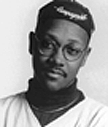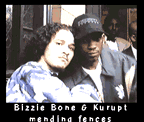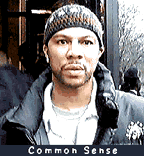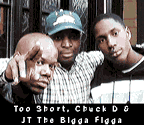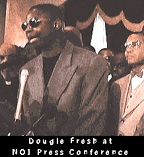The West Coast Hip Hop Summit:
Who? What? Where? Why? & How?
by Davey D... 2/19/02
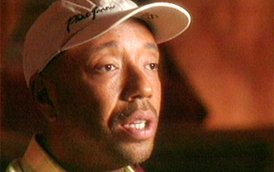
(Feb. 19, 2002) Last week's
West Coast Hip Hop Summit held at the very posh Four Seasons Hotel in LA, was to say the least, quite an experience. For those who don't know, music mogul
Russell Simmons,
Minister Ben Muhammed and the
Hip Hop Action Network had initially planned to host a scaled down intimate private gathering of key West Coast figures as they prepared for a much larger national event to take place in June.
However, there was so much interest up and down the West Coast that this 'intimate' meeting quickly turned into a much larger gathering. Much of this increased popularity was the result of several main components that had been set into to motion.
First,
Minister Farrakhan who gave what many considered the best speech of his life at the Hip Hop Summit last June in NY was scheduled to speak again. The atmosphere was amped because The NOI was holding its
Saviours Day program in LA that weekend. This meant Brothers and Sisters from all over the country were touched down in Cali and would likely attend the event. There was great anticipation that the Minister would deliver another compelling address to the Hip Hop community.
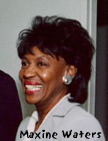
The second thing set in motion was the fact that the West Coast Hip Hop Summit coincided with the
California State wide Democratic Convention which meant a large number of key elected officials would be in LA. The initial plan was to have people like
Congresswoman Maxine Waters and others attend the Summit. The anticipated attendance of elected officials was extremely important since California State assemblyman
Kevin Murray recently announced he would be holding hearings this spring to look into the business practice of record labels who are being accused of under reporting and underpaying artists their royalties.
Adding to that was the current move to repeal a congressional amendment won by the music industry that keeps recording artists locked into contracts longer than talent in other industries such as film and television. If that's not enough, Michigan
Congressman John Conyers who will be in LA today [Tues, Feb, 19] is drafting up a
Bill of Rights for Recording Artists. These and other related issues like '
How the Hip Hop Community Can Flex Its Political Muscle' were on the agenda to be discussed. Present were lobbyist like
Osahar Berry of
Washington, DC Linkage Group, former DC
Mayor Marion Berry,
Melanie Campbell of
Black Youth Vote and representatives from '
Rap the Vote.'
The third wheel set in motion was the outreach efforts done by Minister Ben Muhammed who had made a trip to the San Francisco Bay Area this past November and met with a large number of artists and Hip Hop activists. He was responding to the concerns raised at last year's NY Hip Hop Summit that there were hardly any Hip Hop activists and their respective organizations included in the discussions. Hence he attempted to change that dynamic by meeting with many Bay Area Hip Hop organizations like
Mindz Eye Collective, Lets Get Free, Books Not Bars, Black Dot, Youth Speaks, Urban Campfire, Third Eye Movement, Freedom Fighter Records, United Playas and the
Ella Baker Center to name a few.
Many of these organizations in addition to putting out albums and performing at concerts have succeeded in making Hip Hop a viable tool for organizing and bringing about social change. From the fight against the passing of California's insidious Prop 21-(The Juvenile Crime Bill) to combating police brutality to the current fight to stop the building of a super prison for youth here in Northern Cali, these organizations have come to help shape and represent the new wave of activism among the so called Hip Hop generation. This is important since so many of us are often accused of being indifferent and apathetic. The end result was close to 30% of the West Coast Summit attendees being from the Bay Area.
Minister Ben's outreach efforts were complimented by similar leg work done in Los Angeles. Here, there was an attempt hook up with key individuals, organizations and Hip Hop activists who have been on the front line forging gang truces, quelling Black/Latino racial tensions and working with wayward youths. Individuals like former gang leader
Michael Conception who was responsible for the '
We're All In The Same Gang' project along with LA NOI
Minister Tony Muhammed were key figures who help gather up the troops. Outlets like
The LA Bridge Program, Safe Passages Workers, and
Youth Fair Chance rolled through with key cats like
Mad Bone, Petey Wax, Cat, Stutterbox, Hilly, Tray Dee of
the Eastsidaz and
Malik Stillman to name a few. Also present were Hip Hop activists from Kansas City who had been responsible for helping forging gang truces in that area.
OG Bone who works with Hip Hop artist
Mystikal noted that many of the people present from the LA area including Tray Dee were known more for their being involved and dealing with the gang situation then they were for their work in the music arena. Their presence at the Hip Hop Summit was important because you had once warring gang factions all sitting together in unison in the Four Seasons Hotel. It was great just seeing all the Hip Hop activist both from LA and the Bay all in one place. Simply put it was a beautiful thing.
The fourth wheel set in motion that really caught everyone's attention was a highly anticipated meeting of the minds between former business partners
Suge Knight and
Dr. Dre. When early discussions of a West Coast Summit first ensued, there were efforts to reach out to Dre to have him heavily involved. In fact the initial dates for the West Coast Summit which was scheduled several months back were scraped to accommodate Dre's schedule. Once things got reconfirmed Dre's participation was highlighted front and center.
Over the past couple of weeks, efforts to reach out to Suge Knight were made. The end result was him agreeing to attend the summit and share opening remarks with both Dr. Dre and comedian/radio personality
Steve Harvey. When I first got wind of this, I like many others was a bit surprised. After all, Suge has been doing a lot of press lately and had not held back on making unsavory remarks about Dr. Dre. But if there was any place where the hatchet could be buried it would be at the Hip Hop Summit behind closed doors. Many including myself were hopeful...
MINISTER FARRAKHAN'S SPEECH
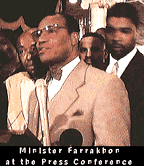
Now the Hip Hop Summit itself started off slow. People came out in force and it was a lot more then was expected. Everyone was searched which time. There was a large contingent of media folks ranging from
CNN to
MTV to local TV outlets. There were also lots of artists ranging from
DJ Quik to the
DOC who made the trek from Dallas. It was a 'Who's Who' of music industry folks. Noticeably absent were
Dr. Dre and
Suge Knight. Word had gotten around that Dre was a bit apprehensive about showing up. Suge sent word that he was stuck in traffic but on his way through. The hotel had to add more chairs as the lines outside the Four Seasons swelled. The Fruits of Islam were dispatched to go to the door and gather up any prominent artists who may have been stuck outside. The West Coast Hip Hop Summit began-45 minutes after its scheduled time... We all stood and prayed and Minister Farrakhan was introduced.
The Minister's speech to say the least was incredible. It built upon the landmark address he delivered at last year's Hip Hop Summit where he called upon artists to step up and accept their responsibilities as world leaders. The main themes of the speech he gave at the West Coast summit centered around the
Hip Hop community becoming closer to God,
recognizing the power of words and a call for the
Hip Hop community to use their influence and become peace makers for the society. He noted that in order for us to establish peace we would have to take the necessary steps to be at peace with ourselves. This meant for us to become more spiritually grounded.
TRUE PATRIOTISM
He started out by talking about the current War on Terrorism and a letter he recently wrote to
President Bush warning him that we as a country were headed on a path that would lead to increased war. He told the Hip Hop audience that he feared that they would be called to fight a war over policies they knew very little about. He also pointed out that many of us were dealing with chemical and biological warfare in our respective communities. He cited the crack cocaine and AIDs epidemic as key examples. He noted that it would be up to the young Hip Hop community to take the bold steps and lead the charge for peace. "
The role of Hip Hop is a lot bigger then you think," he explained.
The Minister spent time focusing on the true meaning of patriotism. He told the audience that true patriots stands for righteous principles and he pointed out the important role
Dr. Martin Luther King and
Muhammed Ali played in standing up against the Vietnam War. He noted that when both men spoke out against the war they were considered ungrateful and unpatriotic but they were able to stand firm because they believed in something bigger then themselves. He noted that both men took stances that only a true patriot could take because it helped bring our government back to its Constitutional principles. He told the rappers never to be afraid to speak the truth. He also noted that as one gets closer to God and becomes more spiritually connected they would have less fear and feel more secure.
THE POWER OF WORDS
Minister Farrakhan spent a lot of time talking about the power and influence of the spoken word. He gave a historical break down of the
African Oral Tradition and showed how it surfaced in various music forms throughout the years as coping mechanism. "
Adversity is the mother of creativity," he stated. "
Hip Hop was created out of our communities pain and suffering. It provided us a way to cope and ultimately change our reality."
He explained how slaves used the power of the word through spirituals to get through the horrors they experienced and to ultimately change their realities. He quoted from old spiritual songs like '
Swing Low' songs to show how the slaves cleverly used metaphors and manipulated words to secretly communicate with one another. He also spoke about the origins of other music genres like gospel, blues, jazz, soul music and R&B and showed how they too all started out as a way for us to combat oppression and ultimately serve the community. I wish I could break it down the way he did, because writing about it does no justice. All I know is that he had cats riveted to their chairs as he kicked the science.
He then asked the Hip Hop community to be responsible for their God given talent. "Little kids can't read 'dikk and Jane,' but they can recite every word to one of your raps," Minister Farrakhan noted. "You are second moms and dads to those who listen to you...We need more educational raps and more rappers willing to teach since so many kids won't go to school."
He asked the rap artists to help in the process of getting our community to move in the right direction and to start teaching knowledge so that people who listen to them will know what they need to fight in this society. He asked the rappers to use their music to help break down the system and show people how it works. "
Either we're killing our people or raising them up," he said. "
We need educational raps and more rappers willing to teach because so many kids won't go to school."
The Minister warned the rappers to be careful and not have their talent be used as weapons against them and the community. He pointed out that many artists like creating raps about pimps, hoes and hustlers which in turn are heavily marketed and promoted by many within the music industry. He broke it down and explained that the young people who grow up admiring these artists will strive to emulate the negative images that are being heavily promoted. He noted that reason such negativity is hyped up is to help keep our community at a level where we can be dealt with. He shrewdly pointed out, that as young easily influenced youth seek to become pimps, hoes and hustlers, they fall into the waiting arms of those who control the
Prison Industrial Complex. The Minister pointed out that there are many that are making a fortune arresting 'pimps,' 'hoes' and 'hustlers.'
During his speech Farrakhan chastised those who are in key positions within the music industry for deliberately downplaying the positive messages and attempts put forth by artists. He told industry cats that many of them have become rich promoting filth and encouraging the marketing of a negative mindset. He asked label executives to use their vast resources and influence to help artists put forth positive messages calling for peace and social upliftment.
The Minister broke down the science behind media manipulation and the deliberate marketing of negative images. He cited and later gave several examples of how those with ill intent in the media can take a 30 second sound bite and make even Jesus look bad. He explained how our words and actions are often maligned and twisted to make us appear and seem a certain way especially when taken out of context. He also noted that these twisted images can sway people to think and act a certain way.
Minister Farrakhan concluded his remarks by asking the rappers to realize that what they speak on will eventually manifest itself. He noted that rappers are able to conjure up powerful images that resonate in the minds of those who listen. "
You form images in the minds of young people who grow up and strive to become the images you help form," he said. He warned the artists that if they were not careful, they would one day have to answer to they type images they are helping create in their raps. I thought it was one of the Minister's most important points.
"
Take up the mantle of leadership and pray to God to help you use your talents...Become architects of a brand new world, rise to your divinity and help us get back to our humanity," are the words he echoed to a standing ovation.
